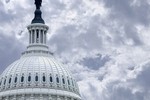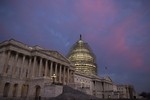Legislation that would deepen the pool of sophisticated investors who can participate in private securities offerings and expand the lending capability of business development companies is gaining momentum in Congress.
On Nov. 1, the House approved a bill to reform the accredited investor standard by broadening it to include people with securities licenses, such as investment advisers and brokers, as well as those with special expertise to invest in businesses that center on their specialty. Currently, people must meet income and net-worth requirements to be accredited.
This week, House lawmakers introduced a measure that would allow BDCs to use more leverage when providing loans to startup companies. Another new bill designed to foster capital formation would ease regulations on closed-end funds.
Advertisement
The House passed the accredited investor bill by voice vote, and the BDC bill has bipartisan cosponsors, Reps. Steve Stivers, R-Ohio, and Gwen Moore, D-Wisc. The bipartisan activity on Capitol Hill dovetails with Securities and Exchange Commission Chairman Jay Clayton's desire to get more ordinary investors involved in initial public offerings.
"Democratization of access to capital for small businesses is broadly a Republican goal, while the access to wealth creation for the middle class is broadly a Democratic goal," said D.J.. Paul, co-founder of Crowdfunding Intermediary Regulatory Advocates.
The accredited investor bill does not yet have a Senate companion, but there is interest in such legislation, said Anya Coverman, director of government affairs and general counsel at the Investment Program Association, a trade group that advocates for investments like real estate investment trusts, BDCs, close-end funds, and energy and equipment leasing programs.
"You hear a lot that Senate members, especially on the Banking Committee, want to work on legislation that has bipartisan support," Ms. Coverman said.
The growing legislative and regulatory interest in alternative investments could come with an investor-protection drawback. As ordinary investors participate in alternatives, they also become more vulnerable to risk. Last year, the Financial Industry Regulatory Authority Inc. implemented a rule designed to increase pricing transparency of illiquid investments, such as nontraded real estate investment trusts.
Bill Kelly, chief executive of the Chartered Alternative Investment Analyst Association, said he favors a "democratized" financial market. But broadening the landscape also requires taking into account that small investors don't have the wherewithal of institutional investors to analyze offerings.
"You've got to make sure the playing field is level, and that will be a big challenge for people who have this access," Mr. Kelly said. "Risk has to be at the forefront of everybody's mind."
As investors have sought higher yields, some have turned to BDCs, which are firms that provide loans to small- and medium-size companies. The House bill would allow them to increase their leverage ratio to 2:1 from 1:1.
(From 2015: SEC's Mary Jo White rips bill to ease restrictions on BDCs)
Joseph Glatt, general counsel at Apollo Investment Corp., a global alternative asset manager, said BDCs give ordinary investors a way to participate in local startups.
"BDCs are Main Street funding Main Street," Mr. Glatt said. "Increasing leverage a modest amount will ultimately be a net positive for the economy and marketplace by freeing up capital that can go to small- and medium-size businesses that may find traditional bank capital unavailable."
He argues that BDCs, which must register with the SEC and make regular disclosures, are a safe investment.
"Retail investors benefit from the regulatory overlay that BDCs have," Mr. Glatt said.
Another protection for ordinary investors are their investment advisers, according to Mr. Kelly.
"The role these RIAs play will be critically important, because they are going to be the vetting mechanism for their clients, who are the accredited investors," he said.









